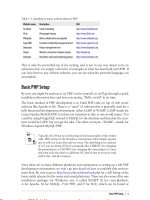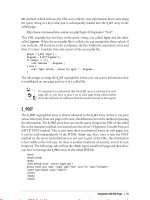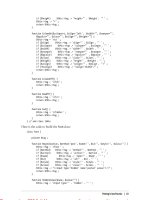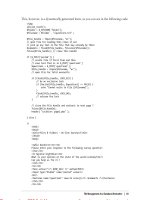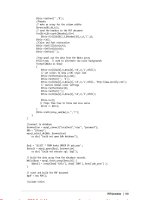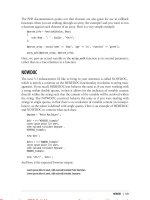The best of charlie munger 1994 2011
Bạn đang xem bản rút gọn của tài liệu. Xem và tải ngay bản đầy đủ của tài liệu tại đây (3.05 MB, 349 trang )
The Best of Charlie Munger: 1994-2011
A collection of speeches, essays, and Wesco annual meeting notes
October 2, 2012
Dear fellow BRK shareholders,
I am a faithful BRK shareholder living within reasonable driving distance to Omaha. I
usually drive up early morning of the BRK annual meeting, attend the meeting until 5pm,
and drive back home the same day, just to save a few pennies. But I’ve been too cheap
to pay for airfare and hotel rooms to attended Charlie Munger’s Wesco annual meetings
in Pasadena.
When I heard that July 2011 would be the last meeting with Mr. Munger, I felt real regret
for never attending one in the past and was desperately searching for Wesco meeting
notes. When I contacted Mr. Whitney Tilson, he kindly emailed me not only his articles
and notes from the many Wesco annual meetings he’d attended, but also many other
relevant materials from his archives, dating back to 1994. At his suggestion, I have
compiled them, along with some of the materials I’ve collected over time, into one file
that he can circulate to the BRK faithful and put on his website. I’m happy to do this as a
way to give back to the value investing community.
I have set up a bookmarks system in the pdf file to ease your navigation, which you can
access by clicking View, Navigation Panels, Bookmarks.
If you have Wesco meeting notes prior to 1999 or any other materials that you think I
should include, please email me and I will revise my compilation.
Sincerely
Yanan Ma Bledsoe
Ballwin, MO
Table of Contents
2002 Tilson’s column: “Munger on Human Misjudgments”
Page 5
1994 Munger on “The Psychology of Human Misjudgment”
Page 9
1995 Munger’s speech at USC: “A Lesson on Elementary,
Worldly Wisdom as it Relates to Investment
Management and Business”
Page 36
1998 Munger on “Investment Practices of Leading Charitable
Foundations”
Page 72
1999 Munger’s “Master’s Class” on Foundation Investing
Page 77
2000 Munger’s speech to the Philanthropy Round Table
Page 83
2001 Munger on “The Great Financial Scandal of 2003”
Page 88
2004 Tilson’s column, “Munger Goes Mental”, on Munger’s
Speech at UC Santa Barbara
Page 96
2003 Munger’s speech at UC Santa Barbara: “Academic
Economics: Strengths and Faults After Considering
Interdisciplinary Needs”
Page 100
2009 Munger on “Sacrificing To Restore Market Confidence”
Page 125
2011 Munger’s “A Parody about the Great Recession”
Page 127
1999 Wesco meeting notes
Page 133
2000 Wesco meeting notes
Page 138
2001 Tilson’s column: “Charlie Munger Holds Court”
Page 146
2001 Wesco meeting notes
Page 149
2002 Tilson’s column: “The Best of Charlie Munger”
Page 159
2002 Wesco meeting notes
Page 163
2003 Tilson’s column: “Charlie Munger’s Worldly Wisdom”
Page 173
2003 Wesco meeting notes
Page 177
2004 Wesco meeting notes
Page 193
2005 Wesco meeting notes
Page 216
2006 Wesco meeting notes
Page 246
2007 Wesco meeting notes
Page 274
2008 Wesco meeting notes
Page 296
2009 Wesco meeting notes
Page 311
2010 Wesco meeting notes
Page 322
2011 Wesco meeting notes
Page 334
Munger on Human Misjudgments
Charlie Munger gave an insightful speech on “24 Standard Causes of Human
Misjudgment,” which has powerful implications for investors. Whitney Tilson summarizes
some key points and provides a link to the speech, so you can read for yourself.
By Whitney Tilson
Published on the Motley Fool web site, 8/21/02
( />Behavioral finance -- which examines how people’s emotions, biases, and misjudgments affect
their investment decisions -- is one of the least discussed and understood areas of investing. Yet I
believe it’s critically important -- so important, in fact, that I covered it in my very first column
(in September 1999, which seems like an investing lifetime ago, doesn’t it?).
Behavioral finance recently reappeared on my radar screen when I came across an 80-minute
recording of a speech given by Berkshire Hathaway (NYSE: BRK.A) Vice Chairman Charlie
Munger, Warren Buffett’s right-hand man and a genius in his own right. It’s a brilliant, powerful,
and compelling tour de force.
In it, Munger highlights what he calls “24 Standard Causes of Human Misjudgment,” and then
gives numerous examples of how these mental weaknesses can combine to create “lollapalooza”
effects, which can be very positive -- as in the case of Alcoholics Anonymous -- or frighteningly
negative, such as experiments in which average people end up brutalizing others.
I’d like to highlight some of Munger’s most important lessons, especially as they relate to
investing.
Psychological denial
Munger notes that sometimes “reality is too painful to bear, so you just distort it until it’s
bearable.” I see this all the time among investors -- both professionals and average folks. Think
of all the people who simply have no business picking stocks, such as the “bull market geniuses”
of the late 1990s, whose portfolios have undoubtedly been obliterated in the bear market of the
past two and a half years.
You’d think these people would’ve recognized by now that whatever investment success they
had in the late ‘90s was due solely to one of the most massive bubbles in the history of stock
markets, and that they should get out while they still have even a little bit of money left. I’m sure
some are doing so, but many aren’t because they’d have to acknowledge some extremely painful
truths (e.g., they should not, and should never have been, picking stocks; they speculated with
their retirement money and frittered most of it away, and so on).
Instead, I’m still getting emails like this one, from people who, I suspect, are in serious
psychological denial:
-5-
Why isn’t anyone suggesting WorldCom as an investment possibility? Assuming
WorldCom survives, and assuming they reach a third of their highest stock value prior to
the decline, why not buy shares at $0.19 (as listed now) [they’re now down to $0.124]
and hold them for a few years? If WorldCom manages to make it back to $10.00 a share,
the profit for a small investor would be more than satisfactory. What am I missing here?
It seems like another chance to ‘get in on the ground floor.’
The answer is that WorldCom equity is almost certain to be worthless, and the only sane people
buying the stock right now are short-sellers covering their very profitable shorts.
Bias from consistency and commitment tendency
Munger explains this bias with the following analogy: “The human mind is a lot like the human
egg, and the human egg has a shut-off device. When one sperm gets in, it shuts down so the next
one can’t get in.” In other words, once people make a decision (to buy a stock, for example), then
it becomes extremely unlikely that they will reverse this decision, especially if they have
publicly committed to it.
This is true even if overwhelming evidence emerges indicating the initial decision was
disastrously wrong. Have you ever bought a stock such as Lucent, Enron, or WorldCom, seen
your original investment thesis torn to shreds by subsequent developments -- such that you
would never consider buying more of the stock (despite the lower price), yet you didn’t sell? I’ve
written two columns on this common, painful mistake.
Over-influence by social proof
Human beings have a natural herding tendency -- to look at what everybody else is doing and do
the same, however insane that behavior might be. Munger gives a classic example from
corporate America:
Big-shot businessmen get into these waves of social proof. Do you remember some years
ago when one oil company bought a fertilizer company, and every other major oil
company practically ran out and bought a fertilizer company? And there was no more
damned reason for all these oil companies to buy fertilizer companies, but they didn’t
know exactly what to do, and if Exxon was doing it, it was good enough for Mobil, and
vice versa. I think they’re all gone now, but it was a total disaster.
Similar behavior led to the tech stock bubble of the late 1990s. For more on this topic, see my
column The Cocktail-Party Test, in which I argue, “Following the crowd and investing in what is
fashionable is a recipe for disaster. Instead, look for solid companies with strong balance sheets
that are either out of favor with Wall Street or, better yet, not even on Wall Street’s radar
screen.”
Other questions Munger answers
I’ve cited only a few examples of Munger’s powerful observations and the answers he gives to a
range of perplexing questions, such as:
-6-
Why are boards of directors so consistently dysfunctional and unable to rein in even the
most egregious behavior by CEOs?
Why was the introduction of New Coke almost one of the costliest business blunders of
all time?
Why didn’t Salomon’s CEO John Gutfreund or General Counsel Donald Feuerstein
immediately turn in rogue employee Paul Mozer -- a failure of judgment that cost both
men their careers and nearly put Salomon out of business?
How did Joe Jett lose $210 million for Kidder Peabody (and parent company GE)?
How did Federal Express solve the problem of processing all of its packages overnight?
Why wouldn’t Sam Walton let his purchasing agents accept even the tiniest gift from a
salesperson?
How does Johnson & Johnson ensure that it evaluates and learns from its experience
making acquisitions?
How has Tupperware “made billions of dollars out of a few manipulative psychological
tricks?”
Why do bidders consistently overpay in “open-outcry” actions?
Why is a cash register “a great moral instrument?”
Why would it be evil not to fire an employee caught stealing?
Why might raising the price of a product lead to greater sales?
Why do some academicians continue to cling to the Efficient Market Theory?
Why are people who grow up in terrible homes likely to marry badly? And why is it so
common for a terrible first marriage to be followed by an almost-as-bad second
marriage?
How can real estate brokers manipulate buyers?
How do lotteries and slot machines prey on human psychology?
Why should we be grateful that our founding fathers were “psychologically astute” in
setting the rules of the U.S. Constitutional Convention?
There is no space here to even begin to summarize Munger’s answers to these questions, so I
transcribed his speech and posted it here. I urge you to read it.
-7-
If you find his thinking and the field of behavioral economics as fascinating as I do, I suggest
reading Influence, by Robert Cialdini, Why Smart People Make Big Money Mistakes, by Gary
Belsky and Thomas Gilovich and, for the definitive work on Munger himself, Damn Right!
Behind the Scenes with Berkshire Hathaway Billionaire Charlie Munger, by Janet Lowe.
Guest columnist Whitney Tilson is managing partner of Tilson Capital Partners, LLC, a New
York City-based money management firm. He owned shares of Berkshire Hathaway at the time
of publication. Mr. Tilson appreciates your feedback at To read his
previous columns for The Motley Fool and other writings, visit . The
Motley Fool is investors writing for investors.
-8-
-9-
-10-
-11-
-12-
-13-
-14-
-15-
-16-
-17-
-18-
-19-
-20-
-21-
-22-
-23-
-24-
-25-


